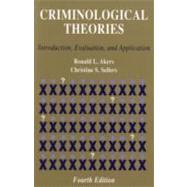
| Introduction to Criminological | |
| Theory What is Theory? | |
| Types of Criminological | |
| Theories Criteria for Evaluating | |
| Theory | |
| Summary | |
| Deterrence and Rational Choice | |
| Theories Classical Criminology and the Deterrence | |
| Doctrine Modern Deterrence | |
| Theory Rational Choice | |
| Theory Deterrence and Criminal | |
| Justice Policy Scared Straight, Shock Incarceration, and Boot Camps | |
| Routine Activities | |
| Theory | |
| Summary | |
| Biological Theories | |
| Lombroso and Early Biological | |
| Theories Modern Biological | |
| Theories of Crime and Delinquency | |
| Empirical Validity of Biological | |
| Theories of Criminal Behavior | |
| Policy Implications of Biological | |
| Theories | |
| Summary | |
| Psychological | |
| Theories Psychoanalytic | |
| Theory Personality | |
| Theory Psychological Counseling in Delinquency | |
| Prevention and Treatment | |
| Summary | |
| Social Learning | |
| Theory Introduction Sutherland's | |
| Differential Association | |
| Theory Akers' Social Learning | |
| Theory Empirical Validity of Social Learning | |
| Theory Applications of Social Learning | |
| Theory Prevention and Treatment | |
| Programs | |
| Summary | |
| Social Bonding and Control | |
| Theories Introduction Early Control | |
| Theories Hirschi's Social Bonding | |
| Theory Gottfredson and Hirschi: Self-Control | |
| Theory Policy Implications of Control | |
| Theories | |
| Summary | |
| Labeling Theory Introduction | |
| Labeling as a Process of Symbolic Social Interaction | |
| The Label as an Independent | |
| Variable in Crime and Deviance | |
| Empirical Evidence on Labeling | |
| Theory Implications of Labeling | |
| Theory: Juvenile Diversion Programs | |
| Braithwaite's Reintegrative Shaming | |
| Theory Reintegrative Shaming, Restorative, Justice, and Faith-Based Programs | |
| The Past and Future of Labeling | |
| Theory | |
| Summary | |
| Social Disorganization, Anomie, and Strain | |
| Theories Introduction | |
| Social Disorganization and the Urban | |
| Ecology of Crime and Delinquency | |
| Classic Anomie/Strain | |
| Theory Research on Classic Anomie/Strain | |
| Theories Contemporary Anomie/Strain | |
| Theories Community Projects | |
| Based on Theories of Disorganization, Anomie, and Delinquent Subcultures | |
| Policy Implications of Contemporary Anomie/Strain | |
| Theories | |
| Summary | |
| Conflict Theory Introduction Consensus and Functionalist | |
| Theories of Law Conflict | |
| Theory of Law and Criminal | |
| Justice Empirical | |
| Validity of Consensus and Conflict | |
| Theories of Law and Criminal | |
| Justice Conflict | |
| Theory of Criminal Behavior | |
| Empirical Validity of Conflict | |
| Theory on Criminal Behavior Policy | |
| Implications of Conflict | |
| Theory | |
| Summary | |
| Marxist and Critical | |
| Theories Marxist | |
| Theory Marxist | |
| Theory of Law and Criminal | |
| Justice Empirical Adequacy of Marxist | |
| Theory of Law and Justice Marxist | |
| Theory of Crime Critical Criminology | |
| Summary | |
| Feminist Theories Introduction Feminist | |
| Theory of Criminal Justice Empirical | |
| Validity of Feminist | |
| Theories of Criminal Justice Feminist | |
| Theories of Crime Empirical Validity of Feminist | |
| Theories of Criminal Behavior Policy | |
| Implications of Feminist | |
| Theory | |
| Summary | |
| Integrating Criminological | |
| Theories Theory Competition Versus | |
| Theory Integration | |
| Table of Contents provided by Publisher. All Rights Reserved. |
The New copy of this book will include any supplemental materials advertised. Please check the title of the book to determine if it should include any access cards, study guides, lab manuals, CDs, etc.
The Used, Rental and eBook copies of this book are not guaranteed to include any supplemental materials. Typically, only the book itself is included. This is true even if the title states it includes any access cards, study guides, lab manuals, CDs, etc.